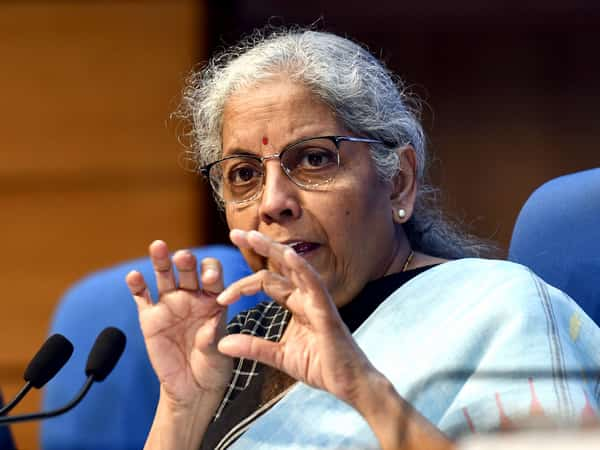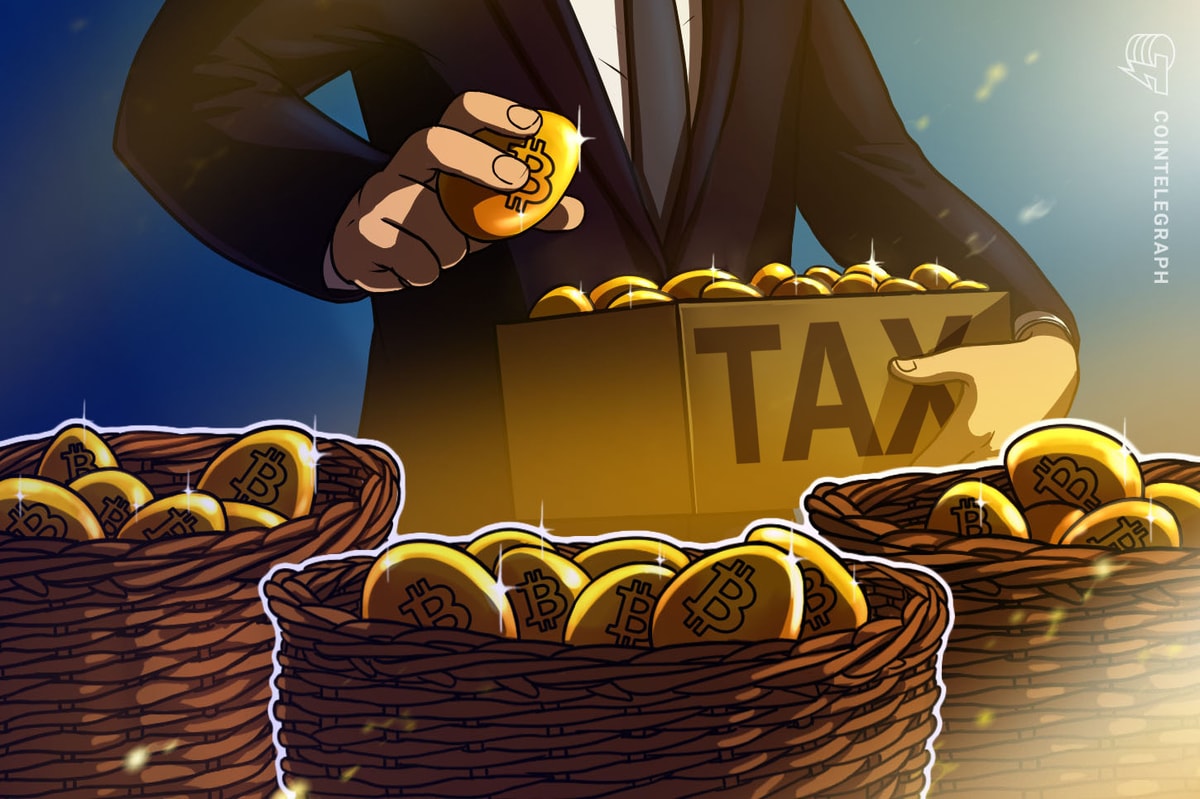Soldiers relax at a rehabilitation course in between tours in northeastern Ukraine.
Claire Harbage/NPR
hide caption
toggle caption
Claire Harbage/NPR

Soldiers relax at a rehabilitation course in between tours in northeastern Ukraine.
Claire Harbage/NPR
KHARKIV REGION, Ukraine — Vlad is one of four soldiers in his unit who survived a tour of duty defending Bakhmut, the city in eastern Ukraine that Russia has tried to capture for months.
“Bakhmut,” he says, his voice breaking. “I don’t know how else to describe it other than a mass grave.”
Skinny, hollow-eyed and only 21, he says he felt so hopeless that his superiors realized he was likely suffering from post-traumatic stress disorder.
A few weeks later, they sent him to northeastern Ukraine for a weeklong rehabilitation course, its exact location a military secret.

The dining hall is filled with soldiers at lunch at a rehabilitation course in northeastern Ukraine.
Claire Harbage/NPR
hide caption
toggle caption
Claire Harbage/NPR

The dining hall is filled with soldiers at lunch at a rehabilitation course in northeastern Ukraine.
Claire Harbage/NPR
In an aromatherapy room scented with eucalyptus and soundtracked with calming flute music, Vlad and about a dozen other soldiers sink into puffy chairs surrounding an indoor garden.
Some fall asleep. Others are with their wives, holding hands. Vlad sits next to his older sister, Iryna, who watches him with troubled eyes. NPR is using only the first names of the soldiers interviewed and their relatives because of privacy and security concerns.
Psychologist Maksym Bayda counsels the soldiers.
“Many can’t sleep. They have nightmares,” Bayda says. “There is also this enormous sense of guilt. They feel guilty about their friends who died on the front line. And — because many of them have never killed a living being — they sometimes even feel guilty about killing enemy soldiers. They use the word ‘murder.’ “

Left: Vlad and his sister Iryna walk through the hallway after visiting an aromatherapy room. Right: Soldiers and their wives or relatives relax in a salt room at a rehabilitation course in a spa in northeastern Ukraine.
Claire Harbage/NPR
hide caption
toggle caption
Claire Harbage/NPR

Left: Vlad and his sister Iryna walk through the hallway after visiting an aromatherapy room. Right: Soldiers and their wives or relatives relax in a salt room at a rehabilitation course in a spa in northeastern Ukraine.
Claire Harbage/NPR
Mental health experts knew more was needed to care for Ukraine’s troops
As Russia’s war on Ukraine drags on, depleting the ranks of Ukrainian troops, the country’s resource-strapped military is trying to find ways to care for soldiers who survive long, brutal deployments.
A lieutenant colonel and a couple of military psychologists, worried about their exhausted troops, opened this rehabilitation program last summer in the Kharkiv region to provide a weeklong break for counseling and relaxation before soldiers return to the front line.
“We first saw the effects of post-traumatic stress disorder on our soldiers back in 2014,” says the program’s founder, Lt. Col. Oleksandr Vasylkovskyi, referring to the year Russia invaded Crimea and Russian proxies occupied part of the eastern region known as Donbas. “I was on the front line then, and I saw it all firsthand.”

Lt. Col. Oleksandr Vasylkovskyi along with some military psychologists opened the rehabilitation program last year.
Claire Harbage/NPR
hide caption
toggle caption
Claire Harbage/NPR

Lt. Col. Oleksandr Vasylkovskyi along with some military psychologists opened the rehabilitation program last year.
Claire Harbage/NPR
Vasylkovskyi knew soldiers who killed themselves. They didn’t seek help, he says, because of the stigma “that they would be seen as weak and defective.”
At the same time, he says, he, too, was struggling with emotional trauma.
“I did not hide it,” he says. “I temporarily quit the army in 2017 to deal with it. My family, especially my wife, encouraged me to see psychologists, and with their help I pulled through.”
After Russia’s full-scale invasion last February, Vasylkovskyi anticipated a mental health crisis among Ukrainian soldiers, especially the tens of thousands of new recruits.

A sign for the aromatherapy room in the spa in northeastern Ukraine.
Claire Harbage/NPR
hide caption
toggle caption
Claire Harbage/NPR

A sign for the aromatherapy room in the spa in northeastern Ukraine.
Claire Harbage/NPR

Soldiers relax in the aromatherapy room in dimmed light.
Claire Harbage/NPR
hide caption
toggle caption
Claire Harbage/NPR
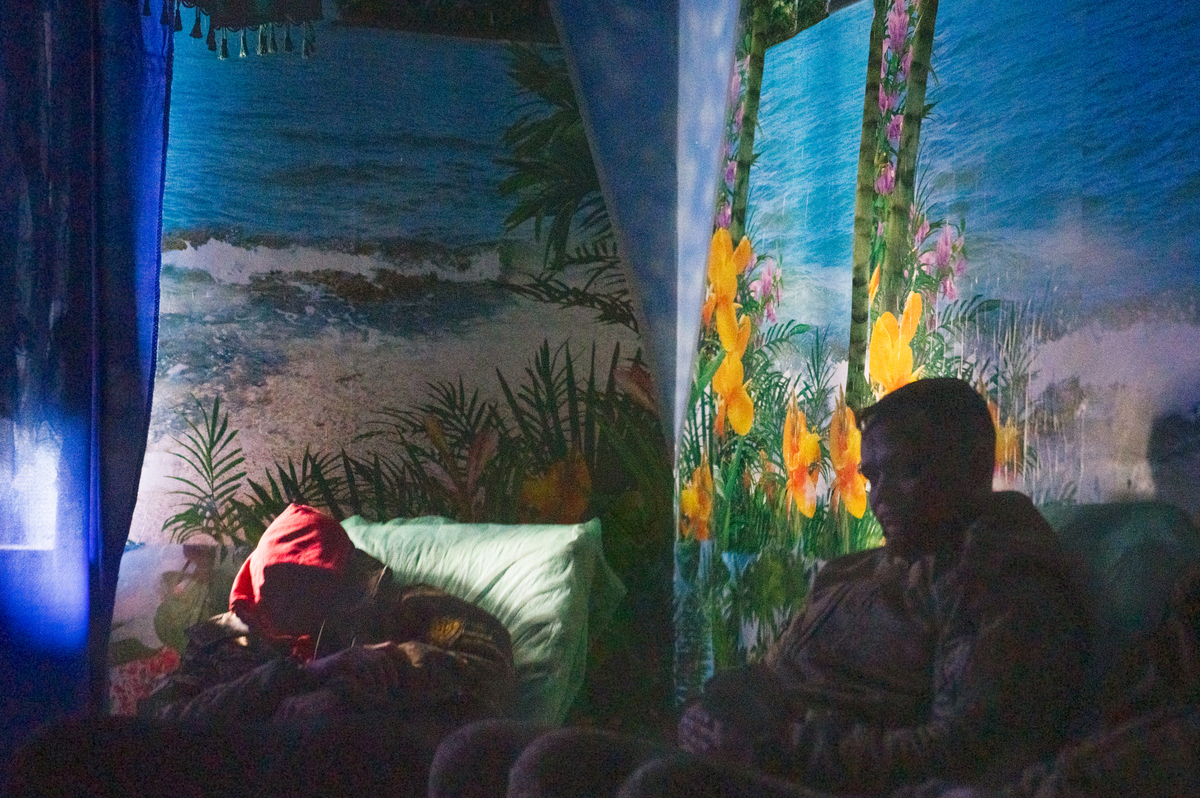
Soldiers relax in the aromatherapy room in dimmed light.
Claire Harbage/NPR
In the last decade, he says, the number of psychologists in the military has increased between 40% and 50%. But even that does not meet the need. And the military, by law, is only required to pay for the treatment of physical injuries.
“I decided that I had to raise money myself to help soldiers get treatment for mental trauma,” Vasylkovskyi says.
Rotary clubs in Kharkiv along with donors from Western countries came through with funding for a center to, in their words, “refresh military personnel.” Vasylkovskyi drafted a short rehab program with a couple of military psychologists — Bayda, a major in the Ukrainian armed forces, and Ihor Prykhodko, a professor at the National Academy of the National Guard of Ukraine.
“We do not have the luxury of completely rehabilitating soldiers psychologically in a week,” Prykhodko says. “Most must return to active combat. So we try to do the best we can.”
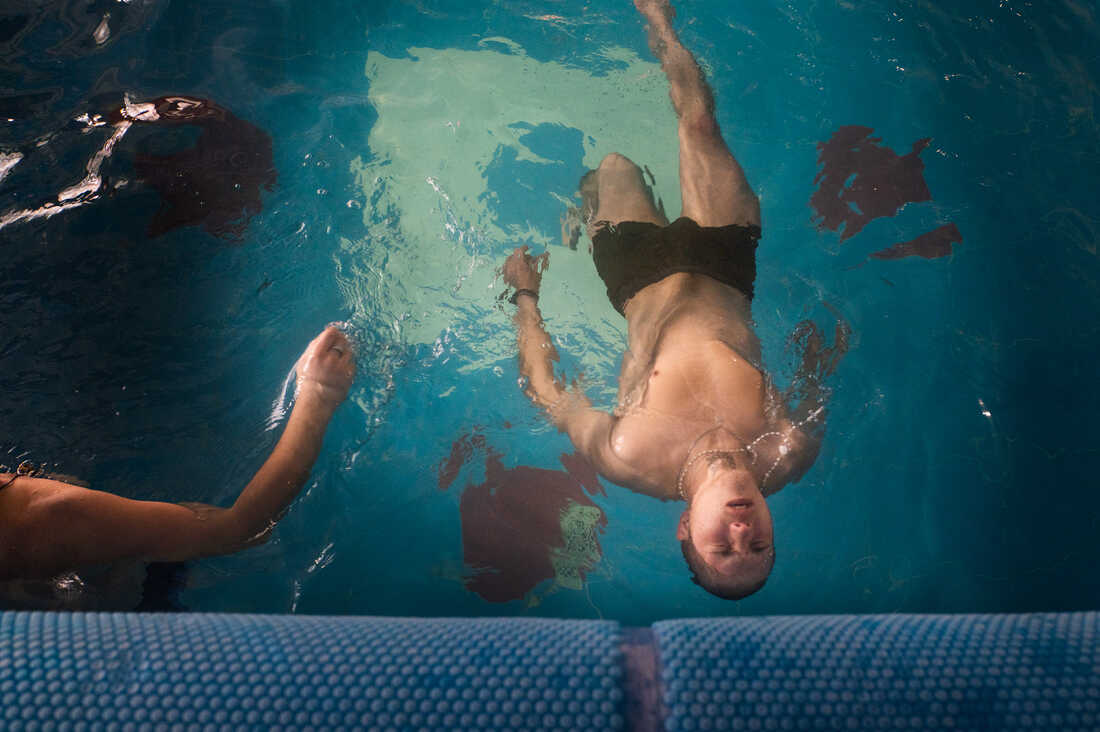
Soldiers spend time swimming in the pool during the course.
Claire Harbage/NPR
hide caption
toggle caption
Claire Harbage/NPR

Soldiers spend time swimming in the pool during the course.
Claire Harbage/NPR
Prykhodko says the team consulted with Western colleagues to design a program that includes counseling, swimming, hydromassage and meditation. And speleotherapy, which recreates certain conditions in natural caves and salt mines to treat respiratory and skin conditions.
He says the program is not only designed to heal soldiers but also show them that they’re valued.
“We wanted to break completely from any vestige of the Soviet past,” he says, “when the individual didn’t matter. In the Soviet Union, the military cared more about propaganda than the health of individual soldiers. We want to remind soldiers that we care about them as people — about their health, their feelings, their lives.”

A fitness instructor leads soldiers in a class that helps strengthen their backs.
Claire Harbage/NPR
hide caption
toggle caption
Claire Harbage/NPR
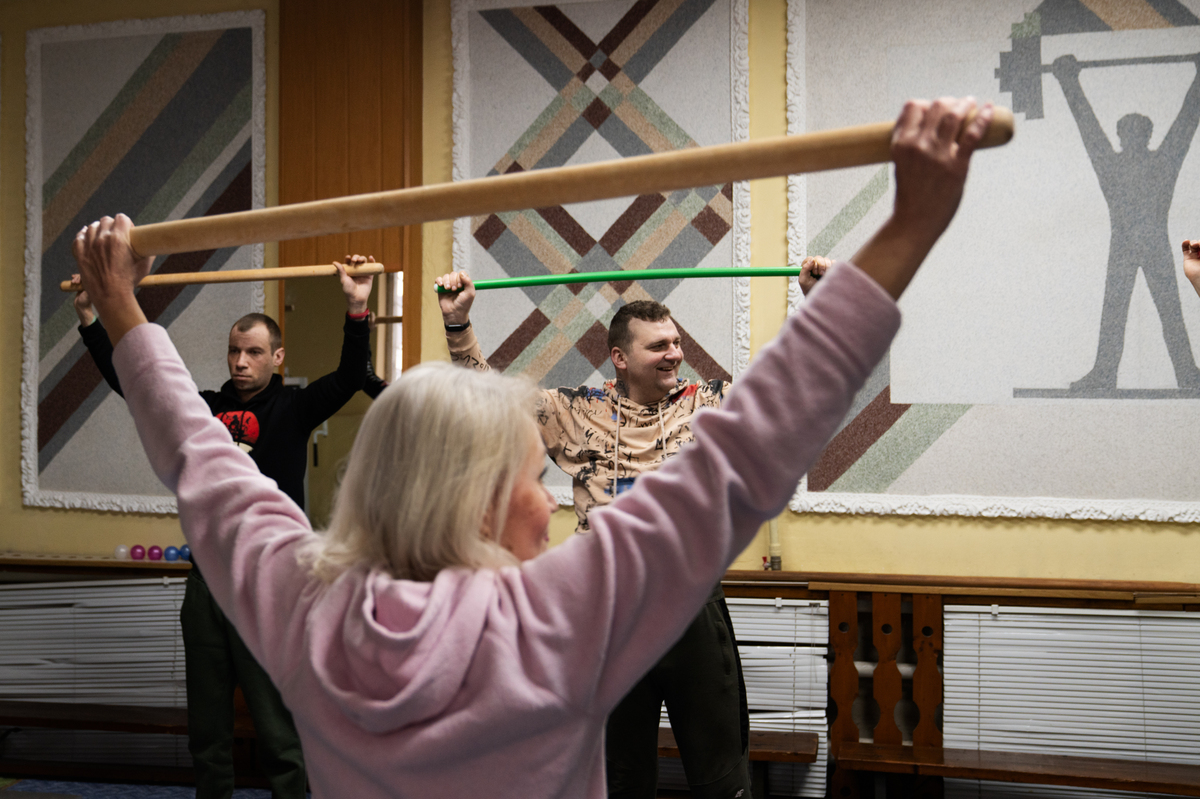
A fitness instructor leads soldiers in a class that helps strengthen their backs.
Claire Harbage/NPR
The program takes soldiers from the front to aromatherapy and counseling
Like most of the soldiers here, Nazar, 25, has been deployed for at least nine months. He spent weeks defending Donbas, most recently in the town of Avdiivka, which Ukraine’s military closed to civilians on Monday, likening it to “a place from post-apocalytpic movies” due to Russian attacks.
“You hear constant shelling, explosions and shooting. It’s exhausting,” he says. “Here it’s so quiet. I’ve started feeling like myself again.”
Earlier, in the aromatherapy room, Nazar had been sitting ramrod stiff in the puffy recliner. Now he cracks an ever-so-slight smile. He’s swimming in the pool along with his friend Maksym, 24, another soldier in the program. Soon they are laughing and splashing each other. A couple of other soldiers join them for pool volleyball.

While throwing around a ball in the pool soldiers begin to smile and sometimes open up to the psychologists.
Claire Harbage/NPR
hide caption
toggle caption
Claire Harbage/NPR

While throwing around a ball in the pool soldiers begin to smile and sometimes open up to the psychologists.
Claire Harbage/NPR
The soldiers wave to Bayda, the psychologist, who motions like he’s going to dive into the water.
“Sometimes the soldiers are so relaxed here that it just makes sense to jump and have counseling sessions here,” he says. “Anything to help them open up and talk about what they’re going through.”
Later, Bayda joins an exercise class where older soldiers are working on strengthening their backs. Mykolai, who is 39, says he injured his back by jumping out of military vehicles.
“My superiors sent me here for my bad back,” he says. “But I have found talking about my fears and grief in this war much more helpful. I have found that I need to talk because I know I will be on the frontline for a long time.”

One soldier works on back strengthening exercises during a fitness class.
Claire Harbage/NPR
hide caption
toggle caption
Claire Harbage/NPR

One soldier works on back strengthening exercises during a fitness class.
Claire Harbage/NPR
Vasylkovskyi and Bayda say about 2,500 soldiers have already gone through the program since the summer. Vasylkovskyi says he sees improvement in the soldiers, but that there should be more programs addressing PTSD.
“They’re already exhausted,” he says, “and this war is far from over.”
At the end of their week at this rehab center, most soldiers return to the frontline. Bayda says he always prays he will hear from them again.
“Just a hello is fine,” he says, “so I know they’re alive.”







:max_bytes(150000):strip_icc()/Health-GettyImages-1252794449-9c24e9a4c42f412c8200943ed0c8e2ec.jpg)






